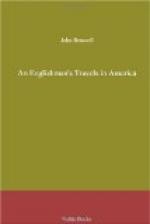while innumerable forms of insect and reptile life, from the tiny yellow scorpion to the murky alligator of eighteen feet in length, give a forbidding aspect to the scene. Racoons, squirrels, wild turkeys, pelicans, vultures, quails, doves, wild deer, opossums, chickmuncks, white foxes, wild cats, wolves,—are ever and anon to be seen among the high palmetto brakes, and the alligators in the bayous arid swamps, “make night hideous” with their discordant bellowings and the vile odour which they emit. The tout ensemble of the place brings to recollection those striking lines of Hood,
“O’er all there hung the shadow
of a fear,
A sense of mystery the spirit daunted,
And said, as plain as whisper in the ear,
The place is haunted.”
During my stay at Fort Andrews, a large detachment of U.S. troops arrived, continuing a campaign against the recreant Indians and negroes. The appearance of the men and officers was wretched in the extreme; they had for weeks been beating through swamps and hammocks, thickly matted with palmetto bush, which had torn their undress uniforms in tatters, searching for an invisible enemy, who, thoroughly acquainted with the everglades, defied every attempt at capture. The whole party looked harassed, disappointed, and forlorn. General Taylor was with and had command of this detachment, which was about 400 strong. As I had heard this man vauntingly spoken of in the north, as the brave cotemporary of Scott, I felt no little curiosity to see him. His appearance surprised me. He was a burly, unmilitary-looking man, of most forbidding aspect, and much more like a yeoman than a soldier. A sword, much out of place, dangled awkwardly by his side, and was the only badge of his profession about him, except a black leathern cap; otherwise, he was habited as a private citizen. His small army encamped below the fort; and, as I thought, in most un-general style, he superintended the erection of his own marquee. He had with him several negroes, who were his body servants; and the coarse epithets he applied to them during the operation did not prepossess me in his favour, or, I thought, reflect much credit on his refinement.
At nightfall cries of distress arose from the marquee, and as I approached it I could distinctly hear one of the bondsmen earnestly pleading for mercy. Listening for a moment, I heard this distinguished general exclaiming vociferously, and belabouring the poor negro heavily with a raw-hide whip; most likely venting the spleen he felt at his non-success against the Indians, the expedition having hitherto been unsuccessful. The poor negro had offended his master, by some trivial act, no doubt, and in southern style he was correcting him, without much regard, it is true, to publicity. This, in southern latitudes, is so common, that it is thought little of; and the occurrence caused on this occasion only a passing remark from those present. The negro was his own, and he had a right, it was




